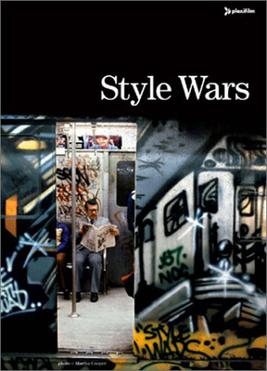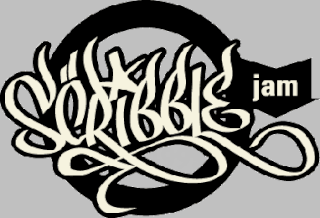
In general, kung fu refers to the Chinese martial arts also called quanfa. In China, it refers to any study, learning, or practice that requires patience, energy, and time to complete. In its original meaning, kung fu can refer to any discipline or skill achieved through hard work and practice, not necessarily martial arts. The literal equivalent of "Chinese martial art" in Mandarin would be 中國武術 zhōngguó wǔshù.
Japanese hip hop is hip hop music from Japan. It is said to have begun when Hiroshi Fujiwara returned to Japan and started playing hip hop records in the early 1980s. Japanese hip hop tends to be most directly influenced by old school hip hop, taking from the era's catchy beats, dance culture and overall fun and carefree nature and incorporating it into their music. As a result, hip hop stands as one of the most commercially viable mainstream music genres in Japan and the line between it and pop music is frequently blurred.

Style Wars is an American 1983 documentary film on hip hop culture, directed by Tony Silver and produced in collaboration with Henry Chalfant. The film has an emphasis on graffiti, although bboying and rapping are covered to a lesser extent. The film was originally aired on the television network PBS and was subsequently shown in several film festivals to much acclaim, including the Vancouver Film Festival. It also won the Grand Jury Prize: Documentary at the Sundance Film Festival.

Beat Street is a 1984 American dance drama film featuring New York City hip hop culture of the early 1980s. Set in the South Bronx, the film follows the lives of a pair of brothers and their group of friends, all of whom are devoted to various elements of early hip hop culture, including breakdancing, DJing and graffiti.
Richard Colón, better known by his stage name Crazy Legs, is an American b-boy who was featured in the earliest stories on hip hop dancing to appear in mainstream press, and as president of the Rock Steady Crew brought the form to London and Paris in 1983. Today he is also involved in community outreach, dance instruction, and dance theater productions. He has appearanced in fiction films and documentaries. Crazy Legs is current president of the Rock Steady Crew.
New Zealand hip hop derives from the wider hip hop cultural movement originating amongst African Americans in the United States. Like the parent movement, New Zealand hip hop consists of four parts: rapping, DJing, graffiti art and breakdancing. The first element of hip hop to reach New Zealand was breakdancing, which gained notoriety after the release of the 1979 movie The Warriors. The first hip hop hit single, "Rapper's Delight" by the Sugarhill Gang, became a hit in New Zealand when it was released there in 1980, a year after it was released in the United States. By the middle of the 1980s, breakdancing and graffiti art were established in urban areas like Wellington and Christchurch. By the early 1990s, hip hop became a part of mainstream New Zealand culture.

Hip hop dance is a range of street dance styles primarily performed to hip hop music or that have evolved as part of hip hop culture. It is influenced by a wide range of styles that were created in the 1970s and made popular by dance crews in the United States. The television show Soul Train and the 1980s films Breakin', Beat Street, and Wild Style showcased these crews and dance styles in their early stages; therefore, giving hip-hop dance mainstream exposure.

Keinan Abdi Warsame, better known by his stage name K'naan, is a Somali-Canadian rapper, singer and filmmaker. He rose to prominence with the success of his single "Wavin' Flag", which was chosen as Coca-Cola's promotional anthem for the 2010 FIFA World Cup. Besides hip hop, K'naan's sound is influenced by elements of Somali music and world music. A Grammy Award-winning artist and FIPRESCI Prize-winning director, he is also involved in various philanthropic initiatives.

Breakdancing or breaking, also called b-boying or b-girling (women), is a style of street dance originated by African Americans and Puerto Ricans in the Bronx.
Wayne "Frosty Freeze" Frost, also known as The Freeze To Please, was an American old school hip hop b-boy known as a member of the second generation of the hip hop/breakdancing group, Rock Steady Crew. His nickname was a play on words based on the well-known milkshake-serving restaurant of the same name.

Scribble Jam was an annual hip hop music festival hosted in Cincinnati, Ohio. Dubbed "America's largest hip hop festival", sort of like Woodstock. It was co-founded in 1996 by "Fat" Nick Accurso, and Jason Brunson, founders of graffiti magazine Scribble, and DJ Mr Dibbs, in the parking lot of a local nightclub. The following year's event benefitted from better publicity, and included MC, DJ and breakdance battles for the first time.
Kenneth James Gabbert, better known by his stage name Ken Swift, is a second generation b-boy, or breakdancer. He was a longtime member and key figure in the Rock Steady Crew, and its former Vice President. He is now President of the Breaklife and VII Gems Hip Hop movement in New York City. Ken Swift began b-boying in 1978, at the age of twelve, when he was inspired by dancers on the Upper West Side of Manhattan. Widely known in the breakdancing world as "the Epitome of a B-Boy," he is widely considered by b-boys to be the individual who has had the greatest influence on breakdancing. Ken Swift is credited with the creation of many dance moves and terminology. His original footwork and "freeze style" became a foundational part of breaking, which were considered new concepts at the time.

Saba Saba, also known as Krazy Native is a rapper and social activist from Uganda.
Bataka Squad is a Ugandan hip hop group. The group was formed by Babaluku, Saba Saba aka Krazy Native and Big Poppa Momo MC. Founded in the mid-1990s, it is one of the earliest hip hop groups in Uganda.

Neukölln Unlimited is a 2010 German documentary. The film follows three Lebanese siblings—Hassan, Lial and Maradona—through their daily lives in Berlin's district of Neukölln.

The history of hip-hop dances encompasses the people and events since the late 1960s that have contributed to the development of early hip-hop dance styles, such as uprock, breaking, locking, roboting, boogaloo, and popping. African Americans created uprock and breaking in New York City. African Americans in California created locking, roboting, boogaloo, and popping—collectively referred to as the funk styles. All of these dance styles are different stylistically. They share common ground in their street origins and in their improvisational nature of hip hop.
Nabil Elderkin is an American-born Australian film and music video director and photographer, who is of Iranian and American descent. He is mononymously credited as Nabil in his videos. Elderkin has directed videos for musical artists such as: Dua Lipa, Kanye West, Kendrick Lamar, Frank Ocean, John Legend, Arctic Monkeys, and Foals. Born in Chicago and raised in Australia, he is most recently based in Los Angeles, California.
Babaluku, born Silas Babaluku Balabyekkubo, is a Ugandan rapper, musician, producer, community youth activist and social entrepreneur who raps in Luganda. He is a member of the Bataka Squad. He is the founder of "the Bavubuka Foundation which equips the youth with leadership skills". He is one of the pioneers of "Lugaflow" which is rap music in Luganda. He was featured in a 2008 documentary "Diamonds in the Rough: A Ugandan Hip-hop Revolution" that covered his journey from his crew’s early days of performing in Uganda to performing in at festivals in the United States of America.
Ediu George Stanley Nsamba, also known as "Nes" is a Ugandan film producer, director, cinematographer, screenwriter, editor, spoken-word artist and human rights activist.

Break'n Reality (2012–2014) is a documentary series, produced & directed by Maximilian Haidbauer. The show dives deep into the culture of Break Dance, also called B-Boying and follows some of the most respected dancers around the world as they compete for the world championship title. Season one titled" 3 B-Boys, 1 year, One Passion" featuring B-Boy Roxrite, B-Boy Lilou and B-Boy Neguin released August 2012. Season two titled "Making a living and keep'n it real " released in summer of 2014. The original theme song was recorded and performed by hip hop legend Rakaa / Dilated Peoples who also narrated the show.











